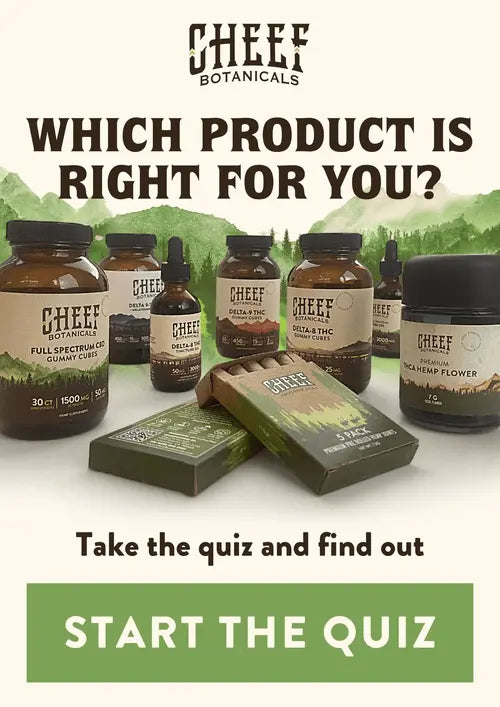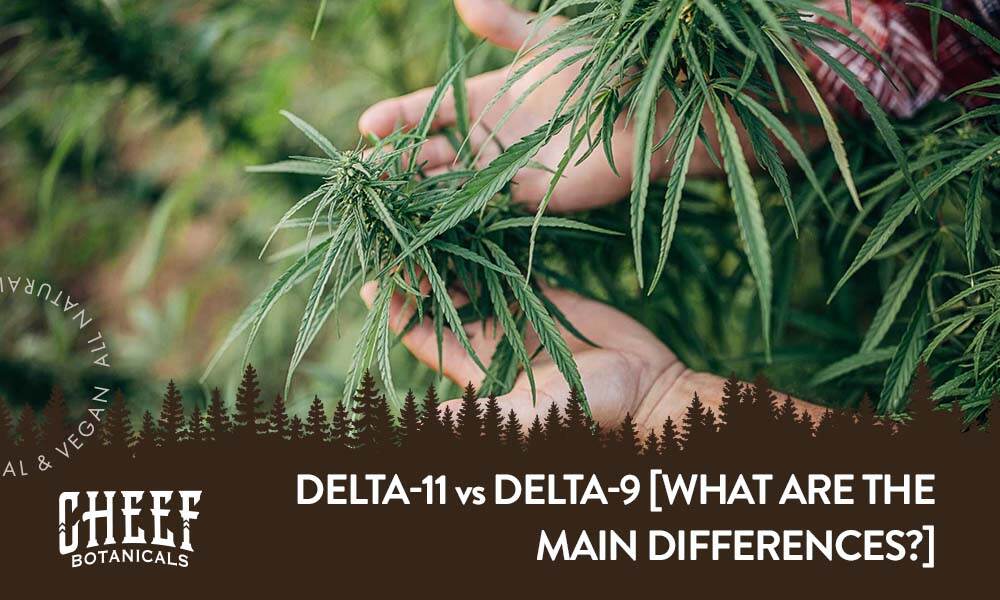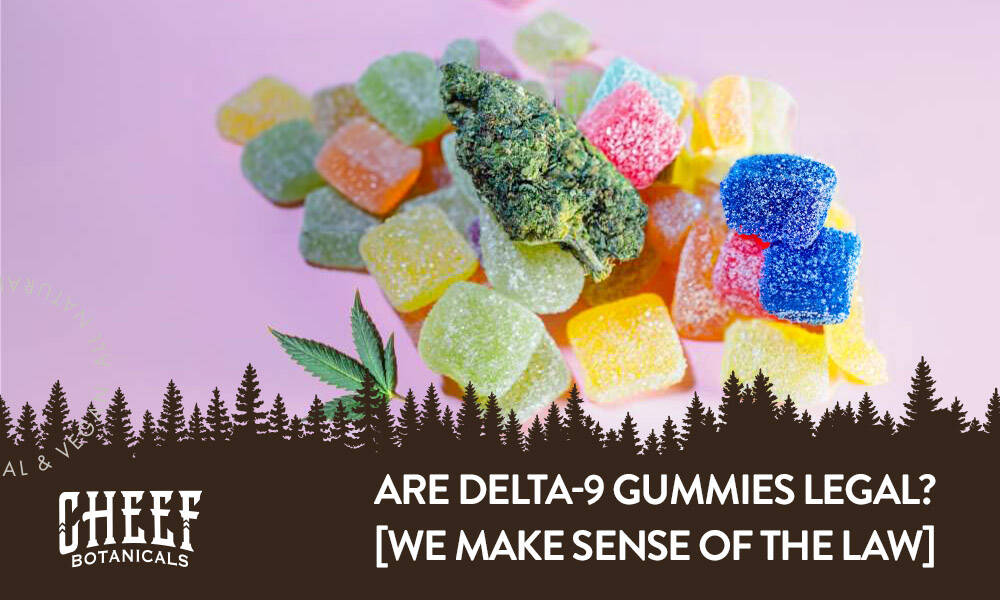In the ever-shifting landscape of cannabis, the spotlight often lands on the newest players in the game. These new sensations bring with them a fresh wave of curiosity and intrigue. Enter Delta 11, the latest cannabinoid that's capturing the attention of enthusiasts and novices alike. So, how does it stack up against the iconic euphoria of Delta 9, the world's most renowned cannabinoid? That's exactly what we're here to uncover in our Delta 9 vs Delta 11 showdown.
The potency of Delta 11 THC often exceeds that of Delta 9 THC, making it a more powerful cannabinoid capable of delivering intense euphoria and strong effects. Due to this higher potency, Delta 11 may provide similar psychoactive benefits at potentially lower doses compared to Delta 9.
Come with us as we peel back the layers to explore the unique characteristics that set Delta 11 and Delta 9 apart, guiding you through the nuances that make each cannabinoid unique. Keep reading to explore the world of Delta 11 vs Delta 9, where every discovery leads to new questions and possibly even more exhilarating experiences.




Final Thoughts – Delta 11 vs Delta 9
Delta 11 emerges as a potent newcomer with the promise of a more intense euphoria compared to Delta 9's well-established effects. Cannabis users may be familiar with the euphoric sensations of THC, but Delta 11 offers an experience that is potentially up to three times stronger. Their differences lie in molecular structure and how each interacts with our ECS. Delta 11 has a stronger binding affinity to your ECS receptors, which is why it produces stronger euphoria than THC.
Whether you're intrigued by the mystery of Delta 11 or prefer the classic effects of Delta 9, responsible use remains paramount. Approach cannabis with an informed and mindful mindset. Always remember to start low and go slow. This is especially true of Delta 11 as its potent effects are subjected and more intense than THC.
What Is Delta 11?
Delta 11 THC (Delta-11-Tetrahydrocannabinol, Delta-11 THC, Delta-11, Delta 11, D11-THC, D11 THC, or D11) is a rare, naturally occurring cannabinoid found in the cannabis plant. Unlike its more famous counterparts, Delta 11 THC has only recently caught the attention of cannabis enthusiasts. Early research and anecdotal evidence suggest that Delta 11 could offer intense euphoria. It is apparently three times stronger than THC. This is due to the cannabinoid's high binding affinity to the body's endocannabinoid system (ECS) receptors. Delta 11, like other cannabinoids, interacts with the ECS in unique ways. Scientists are still working to understand fully the mechanism of this interaction. The cannabinoid's rarity and the emerging nature of its effects mean that Delta 11 products are just beginning to enter the market. These products are derived from hemp plants to comply with federal law. The potential of Delta 11 THC to contribute to physical discomfort relief, reduce stress, and enhance sensory perception has made it an exciting prospect for cannabis consumers looking for new experiences.
What Is Delta 9?
Delta 9 THC (Delta-9-Tetrahydrocannabinol, Delta-9 THC, Delta-9, Delta 9, D9-THC, D9 THC, or D9) is the primary "psychoactive" compound found in cannabis plants. The cannabinoid is responsible for the classic elevation associated with marijuana. Hemp plants also contain Delta 9 THC but in very small concentrations of 0.3% or less. Like Delta 11, Delta 9 THC works by interacting with cannabinoid receptors in the ECS, influencing various physiological processes to produce its effects. The presence of Delta 9 THC in cannabis products is a key factor in the cannabis industry, from the cultivation of cannabis plants to the marketing of products in dispensaries. Delta 9 is particularly interesting to researchers due to its potential to stimulate creativity, ease physical discomfort, and manage appetite, among other benefits.Delta 11 vs Delta 9 - Comparing and Contrasting
Let's take a closer look at the difference between Delta-11 and Delta-9. We'll explore what sets them apart and what qualities these two hemp plant compounds have in common.Differences in Chemical Structure
At the molecular level, Delta 11 and Delta 9 THC share a similar chemical structure. However, key differences in their molecular structure dictate how each interacts with the ECS. The main difference in chemical structure between Delta 11 and Delta 9 lies in the position of a double bond on the carbon chain. In Delta-9 THC, this double bond is located on the ninth carbon atom in the chain, while in Delta-11 THC, it is located on the eleventh carbon atom. This subtle difference in chemical structure leads to variations in their effects on the body, potency, and therapeutic potential. Delta 11's chemical structure also suggests it may bind more efficiently to cannabinoid receptors than Delta 9.Interaction With Your Body's Endocannabinoid System
The ECS plays a crucial role in maintaining the body's balance. It influences everything from discomfort sensation to sleep. Both Delta 11 and Delta 9 THC interact with this system but in ways that result in different experiences. Delta 9 THC's interaction is well-documented. It's known to produce powerful euphoria due to its strong interaction with the ECS receptors in your brain. But Delta 11 THC's effects on the ECS are less understood. We know that it interacts with the ECS receptors in your brain similarly to Delta 9 but with more effective binding. Current research on Delta 11 and anecdotal evidence points to unique interactions that could offer new benefits. Further research will determine the extent of Delta 11 THC's benefits and its ability to produce "psychoactive" effects.Which Cannabinoid Is Stronger?
Determining which cannabinoid is stronger depends on various factors. These include individual body weight, metabolism, previous experience with THC variants, tolerance levels, and the context of "stronger." Consumers often report that Delta 11 provides a more intense experience than Delta 9. However, experiences can vary widely and can be subjective. The concept of "strength" can refer to the intensity of psychoactive effects, the duration of these effects, or the potential for therapeutic benefits.
What Are Their Potential Benefits?
Both Delta 11 and Delta 9 offer a range of potential benefits that cater to the diverse needs of cannabis consumers. Delta 9 THC is famous for its euphoric effects that can lead to altered perception and intense mental stimulation. It's also the primary choice for those seeking discomfort relief, appetite stimulation, and a general sense of positive well-being. Delta 11, on the other hand, is emerging as a powerful cannabinoid that offers even more intense euphoria than Delta 9. Additionally, D11 also has its own set of potential therapeutic benefits. While research is still in its early stages, Delta 11 may help reduce stress, enhance mood, and provide a unique sensory perception that differentiates it from Delta 9. The potential for Delta 11 to offer alternative forms of relief and enjoyment is exciting, promising a new frontier in cannabis use.Potential Side Effects
As with all cannabis-derived products, Delta 11 and Delta 9 come with potential side effects that consumers should be aware of. These side effects are usually the result of irresponsible overconsumption. Common side effects include dry mouth, excessive thirst, extreme euphoria, lethargy, and drowsiness. These effects are generally well-tolerated but can vary significantly from person to person. It's important to approach the consumption of both Delta 11 and Delta 9 with caution. Starting with lower doses and gradually increasing based on personal comfort and desired effects can help mitigate negative effects. Being mindful of the potential risks can enhance the overall experience and ensure safety.Legal Status
The legal status of Delta 11 and Delta 9 THC varies significantly across jurisdictions, heavily influenced by the source of the cannabinoid (hemp plant vs. marijuana plant) and local laws. However, hemp-derived Delta 11 THC and Delta 9 THC products containing THC at concentrations of 0.3% or less are federally legal under the 2018 Farm Bill. This federal law legalized hemp and hemp-derived cannabis products as long as they meet this THC threshold. As with any cannabis product, it's important to stay informed about local laws to ensure full compliance and avoid legal issues. Delta 11 THC and Delta 9 THC products derived from marijuana face stricter regulations and are not federally legal, though many states have legalized them for medical and recreational consumption.Delta 11 Products Available for Purchase Online and in Stores
With the growing interest in Delta 11 THC, a variety of products featuring this rare cannabinoid have started to appear on the market. Consumers can find Delta 11 in edibles, tinctures, and vape cartridges. These products are readily available online and in some licensed dispensaries. As Delta 11 continues to gain popularity, more products will likely become available for enthusiasts to explore and enjoy.Delta 9 Products Available for Purchase Online and in Stores
Delta 9 THC products are widely available and come in various forms. These include edibles, oils, vapes, and flower. The variety of Delta 9 products allows fans to choose the one that best suits their preferences and overeall needs. Remember, hemp-derived Delta 9 products are 100% federally legal as long as they contain 0.3% or less THC. Consumers can easily find these products in states where marijuana is legal for medical or recreational use. They are available both in brick-and-mortar dispensaries and through online platforms.
Can You Detect Delta 11 and Delta 9 in Drug Tests?
Yes, drug tests can detect Delta 11 and Delta 9. Drug tests commonly used by employers and other entities typically screen for THC metabolites. Both Delta 11 and Delta 9 are THC variants. This means that consuming products containing either of these cannabinoids could potentially result in a positive drug test. Individuals who are subject to drug testing need to consider this risk and make informed choices about their cannabis use. If you're regularly subjected to drug tests, we advise you to completely stop taking D11 and D9 products. By following these steps, you'll secure financial pain relief by safeguarding your job and ensuring stability.Delta 11 vs Delta 9 – Which One Is Right for Me?
Choosing between Delta 11 and Delta 9 THC depends on several factors. These include personal preferences, desired effects, and legal considerations. Those seeking a more traditional cannabis experience may prefer Delta 9. Individuals looking for a new and possibly more intense experience might find Delta 11 more appealing. Regardless of the choice, always start with a small dose. Gradually adjust your dose based on your preferences. Remember, personal experience is key to finding the right cannabinoid for you.Cheef Botanicals – The Best Legal Delta 9 Products Online
At Cheef Botanicals, we specialize in all sorts of hemp-derived cannabinoids! While CBD stands out as our premier wellness option, our range of Delta-9 THC products also holds its own. We offer high-quality Delta-9 THC Gummies that are Farm Bill-compliant, safe, and provide a convenient way to enjoy the benefits of THC. Our gummies do not contain animal derivatives, additives, or artificial flavors. Instead, we use various flavors, offering a discreet and enjoyable method to consume cannabis.Cheef Botanicals Delta-9 THC Gummies
- Delta-9 THC Gummy Cubes. Our most popular and straightforward option for Delta-9 THC consumption. Enjoy bite-sized edibles in various natural fruit flavors and potencies.
- Delta-9 THC + CBD Gummies. Indulge in full-spectrum wellness by combining THC's uplifting sensations with CBD's (Cannabidiol) overall wellness benefits. You'll experience a balanced THC experience with calming effects for the mind and body.
- Delta-9 THC Live Resin Gummies. Crafted from Live Resin, a full-spectrum extract from hemp flower harvested at peak potency and flash-frozen to preserve cannabinoids and terpenes. Savor more potent and flavorful gummies, unlocking the full potential of Delta-9 THC through synergistic interaction with other hemp plant compounds.
- Delta-9 THC + CBN Gummies For Sleep. Contains CBN (Cannabinol) to promote faster and longer sleep naturally. Our D9 + CBN Gummies are complemented by melatonin for enhanced sleep support.
- Delta-9 THC Brick Gummies. Pave the way to ultimate THC euphoria! Each Brick contains pure Delta-9 THC hemp extract for maximum THC uplift. Score a piece or take the whole Brick; the choice is yours!




 100mg Delta-9 Gummy - Top Seller
100mg Delta-9 Gummy - Top Seller
 D9-THC Live Resin Gummies - Excellent Choice
D9-THC Live Resin Gummies - Excellent Choice
 D9-THC + CBN Gummies for Sleep - Highly Rated
D9-THC + CBN Gummies for Sleep - Highly Rated
 Delta 9 Gummy Cubes - Good Value
Delta 9 Gummy Cubes - Good Value



Leave a comment
This site is protected by hCaptcha and the hCaptcha Privacy Policy and Terms of Service apply.